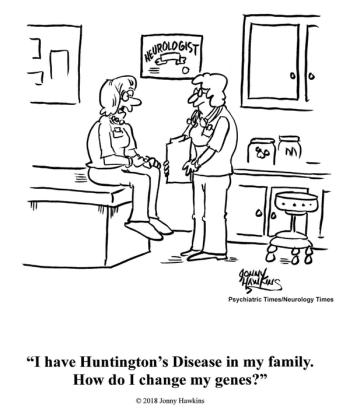
The neurologist discussed an analysis of findings suggesting that opiate agonists may have a role in the treatment of narcolepsy.

The neurologist discussed an analysis of findings suggesting that opiate agonists may have a role in the treatment of narcolepsy.

The clinical professor in pediatric neurology and director of regional neurology services at Children's Hospital Colorado shared her thoughts on why epilepsy is the perfect paradigm to implement telemedicine.

Neurology News Network for the week of November 3, 2018.

In clinical trials, differences in the use of cholinesterase inhibitors and memantine between treatment and placebo groups may lead to the conclusion that a treatment is effective when it is not, or vice versa.

This is the first oral film formulation of clobazam approved, highlighting the challenge of medication administration in patients with LGS, who often struggle due to physical, behavioral, or cognitive impacts.

The neurologist from Cleveland Clinic discussed the challenges of treating progressive MS, and shared his clinical experience with ibudilast.

Although treatment needs to be assessed in a larger trial, it also showed improvements in 2 measurements of functional ability.

The Pediatric Movement Disorders Neurologist at UT Southwestern recommends that when encountering a patient with a movement disorder to organize your thought process in 3 steps.

The compromised microvascular and insulin receptor signaling pathways seen in Alzheimer disease have been shown to be reduced or normalized by exposure to antidiabetic therapies.

The medical director of clinical development at Biogen spoke about the current use of the biomarker and the steps being taken clinically validate it.

The epileptologist discussed this challenge, and shared her thoughts on how to maintain this communication.

The director of the Comprehensive Multiple Sclerosis Center at Thomas Jefferson University provided insight on the potential effect cladribine could have on multiple sclerosis.

Trial results showed a reduction of 61% in disease progression in both primary efficacy endpoints measuring cognition and activities of daily living at 14 months.

I have Huntington disease in my family. How do I change my genes?

The associate professor of neurology and neuroscience at Weill Cornell Medicine discussed this work, and what she and her colleagues believe could be addressed by a successful effort.

In its second phase 2 trial, the therapy, also known as AMO-02, resulted in improvements in cognitive function, fatigue, and neuromuscular symptoms.

The president of the American Headache Society shared her thoughts on how preventive medicines can alter migraine treatment for the better.

People of all ages occasionally report recurrent dreams, and there is an established association between negative dreams and daytime anxiety.

The study presents direct evidence that subjective experiences of insomnia may be coupled to the REM sleep state.

Darryl De Vivo, MD, emphasized that while there's been a tremendous advance in the field of SMA, it’s important to continue tinkering around the margins to make the effective treatment increasingly better.

Zonisamide improved Parkinsonism as an adjunct to levodopa in patients with dementia with Lewy bodies in phase 3 trial.

The study found that there has been a significant increasing trend in patients with migraine—irrespective of aura status—having an ischemic stroke.

Sodium oxybate is the first therapy approved to treat cataplexy or excessive daytime sleepiness in pediatrics with narcolepsy 7 years of age and older.

Despite the explosion of preventive medications for migraine, a large need for acute care remains.

The Sidney Carter Professor of Neurology at Columbia University Medical Center spoke about the 127 year history of spinal muscular atrophy and how basic science has led to exciting developments.

Customizing injection sites and amounts of botulinum toxin for different presentations of essential hand tremor has been shown to avoid hand weakness.

Heidbreder further described the current understanding of the condition and what she and her colleagues have found out.

For the director of the Johns Hopkins Multiple Sclerosis Center, a biomarker is perhaps only as useful as the clinician community’s ability to read out its measurements.

With many advancements in treatments occurring in recent years, the president of the American Headache Society urged for further research to continue to light the way.

Neurology News Network for the week of Oct. 27, 2018.